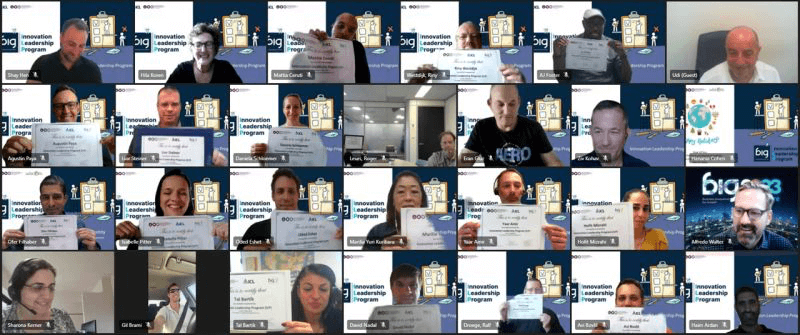ICL’s Hila Koren offers valuable insights into how the company’s culture of innovation is driving organizational success and transforming creative ideas into successful projects with a quantifiable ROI.
ICL is a world-renowned company that grew out of a single pioneering venture in the Negev Desert a century ago. The group is a tech leader in fields as diverse as mineral exploitation and production, agriculture, energy, industrial manufacturing, and health and personal care. One golden thread that runs through all ICL enterprises is a commitment to sustainability, driven by a huge emphasis on innovation.
ICL’s focus on sustainable innovation (and innovation management) is demonstrated by the resources that the company allocates to research and development, but also by its long-term investment in innovation leadership programs and the involvement of employees at every level of the company and from every division.
Innovation leadership programs create a structure and methodology for evaluating and channeling innovative ideas and can allocate resources and human expertise for their implementation. A genuine innovation leadership program also allocates KPIs and measures the actual performance of new projects. An important criteria is to structure projects for full transparency and to judge their success according to tangible and quantifiable metrics.
ICL: Business Innovation for Growth – BIG
ICL’s flagship innovation leadership program is the Business Innovation for Growth program, aptly known as BIG. It encapsulates a revolutionary approach to harnessing innovation as a tool for continuous growth, with a special focus on employee engagement and recognition. BIG is built around three simple concepts: enhancing ideation, accelerating execution, and improving collaboration. The results are tangible – and are impressive.
As of December 2022, BIG has generated:
- 4,748 submitted ideas from ICL employees around the world
- 1,584 live projects, launched with defined goals and metrics
- 1,154 projects completed with full accountability
- $262 million in realized annual operating income
The BIG program has not only generated new revenues that would not otherwise have existed, but it has also fostered employee engagement and generated enthusiasm for creativity, initiative, problem-solving, and original thinking across the global ICL workplace.
Understanding the Importance of Innovation Leadership Programs
Without a genuine culture of innovation, even the most ambitious and forward-thinking companies will only achieve a fraction of their potential. Average companies risk becoming stagnated within their existing markets. Most corporations and organizations pay lip service to the concept of innovation, but few actually nurture a culture of innovation.
Nurturing a culture of innovation requires a proactive approach and a willingness to invest resources and expend energy. Few boards or department heads like to authorize major spending on promoting abstract concepts that are vaguely defined. To successfully develop and expand a culture of innovation within a typical corporation requires a functional program with proven methodology and tangible goals.
Once an innovation leadership program is established, it should be widely publicized. Employees need to see that the actual process of submitting ideas is simple and convenient and (preferably) occurs outside of any existing silos or localized chains of command. If you want to encourage creative thinking, you need an environment where people can express ideas without anxiety – and in the knowledge that their creative thinking will be acknowledged and rewarded.
The Challenges of Implementing a Culture of Innovation
A subtle but persistent obstacle to a culture of creative thinking and innovation can be institutional resistance to change. Even outwardly modern companies that pride themselves on openness can often be hamstrung by structural conservatism and a lack of adaptability. The essence of innovation is adaptability to change and a willingness to explore and experiment with new ideas and new products or markets – or even just reforms and improvements to existing systems and entities.
Innovators within a corporation who can demonstrate that they are driving organizational success are at a clear advantage. At the end of the day, a company – public or private – exists to make money and must justify every initiative. An innovation leadership program that can publish KPIs for each project and present a clear vindication for each commitment in terms of new revenues will rapidly gain influence and credibility.
When innovation generates projects that create a positive environmental impact, the benefits are multiplied on several levels. Environmentally beneficial initiatives immediately boost a company’s ESG ratings and raise its credibility and reputation in the localities where it operates. Environmentally friendly projects are potentially a superb tool for building links and connections with local communities, especially when there is an element of public engagement and consultation.
Introducing Hila Koren: An Expert Insight into BIG and ICL’s Innovation Leadership Program (ILP)
ICL’s Hila Koren is the Senior Manager of the company’s Internal Innovation Accelerator Program. She has been kind enough to share her experiences and offer some expert insights into the challenges – and opportunities – of innovation in the workplace.
Hi Hila, thank you for joining us today! If we may, I’d like to begin by asking you about the concept of “collective intelligence”. I understand it’s highly relevant to the BIG project.
Hi, yes collective intelligence is a really important concept. The BIG program is a company-wide project that covers all ICL operations around the world – that’s Israel, Europe, the US, South America, Asia… we’re truly global.
The innovation management program is run throughout ICL and it allows for collective intelligence to rise up, to shine. When we’re saying collective intelligence, we’re saying that no individual knows where all the good answers or best solutions are. When we open our platform to a large number of employees, we’re tapping into a collective intelligence and a huge range of insights and perspectives. We always get positive surprises, often from people whose day-to-day role has no involvement in a particular topic. They’ve simply seen things from a different angle and come up with a creative idea.
It opens up opportunities for people to think outside their official role and really step up in areas that are their strengths, even though they’re not titled as such. What’s lovely about it is that people can post ideas, but we also have comments going on. A lot of the time, the comments add to the ideas and concepts rapidly evolve. This is where the collective intelligence kicks in because someone can see a raw idea and say, Okay, this is a good start, but from my experience, if you do it at a different temperature with a different kind of raw material or apply the lessons learned from the last project… One person’s original idea becomes a collaborative effort that draws on a wealth of relevant knowledge and experience.
That’s amazing, but how do you encourage employee participation in the first place?
I think there are two main reasons why ICL has been so successful in this field. The first is the caliber of our people. ICL employees are really talented and have a lot of energy and enthusiasm. They love to get involved and thrive in the creative process. We also acknowledge and reward people’s creative input (and not just for ideas that are approved as projects). It’s an informal talent-spotting process that helps us to identify previously unrecognized stars in the company and apply effective career management.
The second reason is that throughout my professional career, I’ve never seen a company put so much effort, energy, attention, resources, thought, and concern, into making a program work. This is why we get such amazing results. All the way from the top, down to the last of employees, people are engaged in a way that’s really exciting. That is partly why BIG has been so successful.
You say it’s “partly why BIG has been so successful”. Are there more reasons?
Yes! We’ve barely scratched the surface of why BIG is such a success story. The structure of the program and our willingness to delegate is hugely important. Initially, there was an Innovation Manager in each business unit, but it quickly became clear that this would never be adequate. We added a hundred “Captains” to assume responsibility for innovation at local sites around the world. Now the Captains also have their own Deputies. There’s a clear chain of command, but it’s also very informal and is really a team effort. Innovation is supposed to be fun!
Another amazing strength is our Innovation Leadership Program (ILP) tailored for both our leaders and coordinators. Through this program, we equip our team members with essential professional tools and training required to effectively oversee and manage innovation. We launched a collaboration with Tel Aviv University, one of Israel’s premier institutions. This partnership involves the Lahav Executive Education of the Coller School of Management. It offers a specialist management course that is superb for fostering career development.
Our decision to join forces with this institution stems from our dedication to providing our team with a fresh and expansive outlook, aiming to truly enrich their perspectives. Our aspiration goes beyond enhancing their comprehension of ICL’s operations; rather, it’s about expanding the horizons of their minds.
Lahav stands as a beacon of excellence among the most reknown and prestigious institutions for management programs, not only within Israel but across the globe. The question arose: What unique contributions could Lahav bring to the table? What could internal ICL speakers offer? These inquiries led to the creation of a remarkable synergy, resulting in a perfect blend of theory and hands-on practice. The outcome is an amalgamation of their expertise -– ICL’s Innovation Leadership Program.
Our participants receive comprehensive education about the current landscape of innovation management. They delve into various theories and the different stages of innovation. This includes its connection to leadership, management, soft skills, and creativity. The theoretical aspects are covered by Lahav. Complementing this, we bring in people leading different roles within ICL, allowing participants to witness the practical implementation firsthand.
The course consists of 13 sessions and it’s very intensive. We have representatives from all ICL business units from all over the world, occupying many different roles. It’s a very heterogeneous group and there’s a lot of sharing of knowledge and skill sets. The students get to learn a lot from each other.
As well as benefiting from peer learning, students receive challenging assignments throughout the training. These include how to run innovation sessions, how to approach leaders and suggest ideation themes, and then they run it themselves. We consistently underscore the significance of identifying opportunities.
We also feature presentations from top management. ICL’s CEO, Raviv Zoller, discusses strategic growth areas, while Anantha Desikan, our CTO, delves into innovation strategies for product development. Noam Goldstein, EVP of Operational Excellence, imparts insights into growth strategies in operational excellence. Ilana Fahima, EVP of Global HR, talks about the power of people and how empowerment and enablement are key drivers for Innovation. Through these sessions, students absorb new material and learn its practical application within their own business units.
The program also imparts a range of skills, like how to do active listening, how to identify opportunities, and how to turn an opportunity they identified into a challenge that people can relate to and contribute to the collaborative process. Upon completion of the program, participants receive a formal certification of Innovation Leaders from Lahav. We just concluded the second cohort and planning for the launch of the third on January 24’.

Where is BIG going from here – how do envision the future of the program?
Wow… The future holds boundless possibilities for BIG! We’re consistently progressing, and the journey ahead is nothing short of remarkable. A pressing goal is the expansion of the program’s reach through translation into four additional languages, apart from English, which will allow us to engage a more diverse audience. Also, we’re broadening the circle of platform access, aiming to empower even more individuals. Our goal is to foster a genuine culture of innovation that permeates and expands across every part of ICL.
We’re also intensifying our focus and dedication to encouraging sustainable innovation and environmentally friendly projects. Each ICL site and division has unique expertise and specialized skills, which makes us especially enthusiastic about the creative ideas that are poised to emerge over the next year or so!
ICL: Innovating for a Better Planet
ICL was built on a spirit of innovation. Its ability to adapt rapidly and embrace change, as well as a passion for new ideas (and some major investments in R&D), allowed the company to expand and become a respected global corporation in the space of a single generation.
ICL’s innovation leadership program is a key component in the company’s drive to create a better world through socially responsible entrepreneurship. Perhaps one of the best things about BIG is that every employee in the company has a voice. Even the newest hire or most junior member of staff can offer creative ideas, be listened to respectfully, and perhaps shape the strategic path of the entire company.
If you love ideas, have a passion for problem-solving, or have an eye for new products and markets, you can become a BIG innovator. If you really love innovating and want to make a greater contribution, you can take things a step further and enroll in the ILP program. ICL is an amazing place for creative people to work and is committed to nurturing talent and rewarding initiative and enthusiasm!








